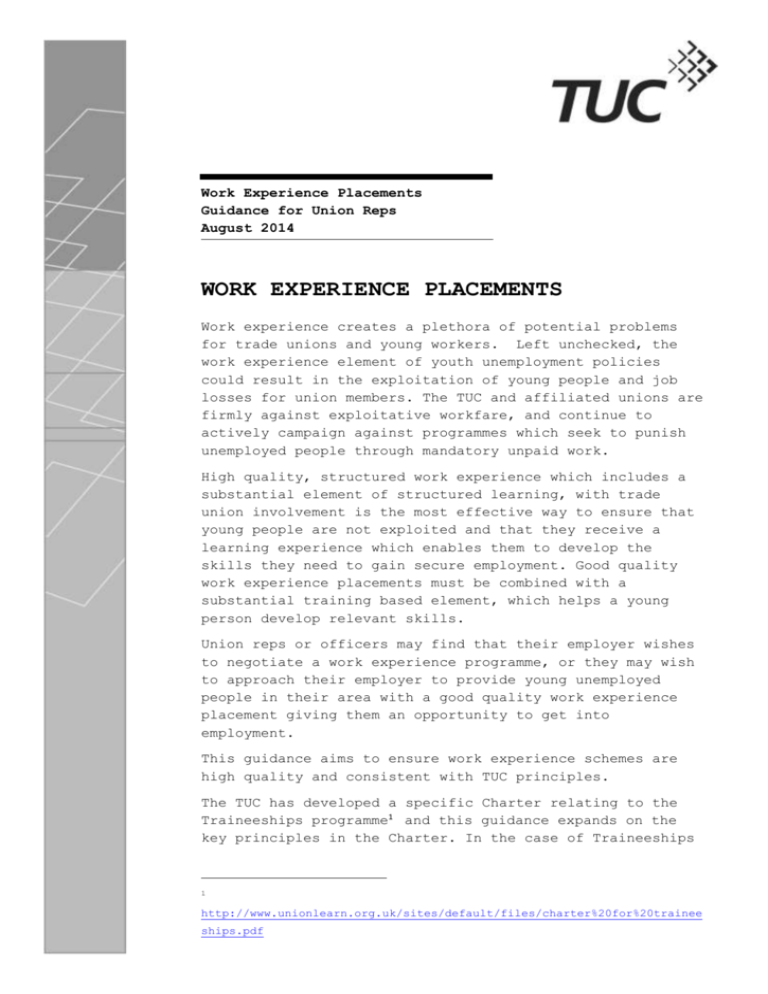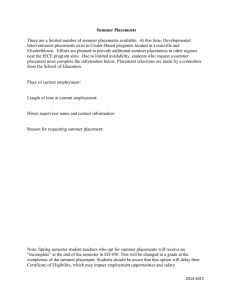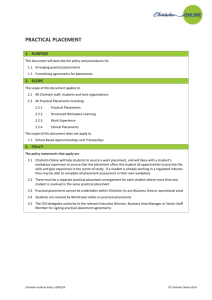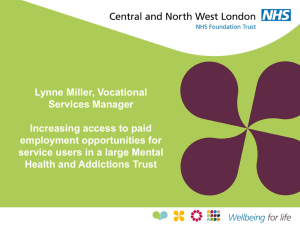Work Experience Placements - Guidance for Union Reps
advertisement

Work Experience Placements Guidance for Union Reps August 2014 WORK EXPERIENCE PLACEMENTS Work experience creates a plethora of potential problems for trade unions and young workers. Left unchecked, the work experience element of youth unemployment policies could result in the exploitation of young people and job losses for union members. The TUC and affiliated unions are firmly against exploitative workfare, and continue to actively campaign against programmes which seek to punish unemployed people through mandatory unpaid work. High quality, structured work experience which includes a substantial element of structured learning, with trade union involvement is the most effective way to ensure that young people are not exploited and that they receive a learning experience which enables them to develop the skills they need to gain secure employment. Good quality work experience placements must be combined with a substantial training based element, which helps a young person develop relevant skills. Union reps or officers may find that their employer wishes to negotiate a work experience programme, or they may wish to approach their employer to provide young unemployed people in their area with a good quality work experience placement giving them an opportunity to get into employment. This guidance aims to ensure work experience schemes are high quality and consistent with TUC principles. The TUC has developed a specific Charter relating to the Traineeships programme1 and this guidance expands on the key principles in the Charter. In the case of Traineeships 1 http://www.unionlearn.org.uk/sites/default/files/charter%20for%20trainee ships.pdf Work Experience Placements this guidance should be read in conjunction with the Traineeships Charter. Key considerations for reps/officers negotiating work experience programmes with employers/providers: The principle of a fair day’s pay for a fair day’s work is a core trade union demand. Should young people on work experience placements begin to undertake work of value the employer will have a legal obligation to pay that person at least the National Minimum Wage. The most effective way to enforce this legal requirement is through trade union involvement. Work experience placements should not continue for more than a few weeks. If they do it is likely that the young person will effectively be doing a real job, in which case they should be paid the appropriate rate for it. Work experience placements must lead to a job or further training e.g. an Apprenticeship Where there is a risk that young people or their families may lose their benefits as a result of getting paid for their work, and where they could face significant delays in being able to sign back on to receive benefits once the work experience has concluded, it is essential that this is addressed. There may well be ways of remunerating young people without risking their benefits, such as through a negotiated lump sum of “financial support” which unions have experience of fighting for. The TUC can provide further guidance on the potential impacts for individual and family benefits of young people’s participation in particular schemes and how to avoid any claw back resulting from payment. Trade union involvement is essential to ensuring that work experience placements are high quality learning opportunities for young people: Trade unions should have access to the young people undertaking work experience placements Trade unions should have a representative on any steering groups/working groups which have oversight of the work experience programme. This should include placement design, delivery and evaluation. Information about workplace employment rights should be provided to all young people It is essential that “whistle blowing” procedures are put in place enabling a young person to complain about their placement, in order to ensure that schemes are not 2 Work Experience Placements contravening any of these key principles. Trade unions should be involved in the design of these procedures so they can provide adequate support to the young person and ensure the young person feels comfortable using any procedures. Work experience placements should not result in any existing workers being displaced. Work experience placements must be in addition to the existing workforce. New job opportunities, including Apprenticeship opportunities, should not be reduced due to the introduction of work experience or Traineeships. Young people are particularly vulnerable and at risk in a new and unfamiliar work environment. They must be supervised at all times. In addition mentors or “buddies” can help the young person acclimatise to the workplace. This is particularly important when young people are involved in production work e.g. involving machinery or equipment The best work experience placements are voluntary. No employer should want to provide a work experience placement to a young person who is not a willing participant. The TUC strongly opposes the government’s sanctions regime, which can impose exceptionally harsh penalties upon young people who do not comply with Jobcentre requirements, and continues to campaign against these sanctions being imposed. Young people who have been mandated to undertake work experience by the Jobcentre, and who face sanctions for non-participation, are unlikely to have a fulfilling or useful experience. Careers guidance should be an integral part of any work experience programme. Prior to a young person commencing a work experience placement, they should have an opportunity to receive face to face, independent careers advice from a qualified careers advisor. This will enable a young person to undertake a work experience placement which not only matches their aspirations, but is also aligned with the job vacancies in the local labour market. Health and Safety of young people: The Health and Safety Executive has published guidance for employers and young people on work experience placements; http://www.hse.gov.uk/youngpeople/workexperience/ The employer should carry out a risk assessment in the workplace which takes into account the particular issues that affect young people, including their lack 3 Work Experience Placements of experience and awareness of risk. They should also consult with the union Health and Safety representatives on the risk assessment and the measures they intend to take. Young people should be given sufficient training on health and safety and fire safety to ensure they are not a risk to themselves or others. Training may also need to be given to other staff on the specific risks involved in working with trainees. Certain groups of young people are significantly underrepresented in training programmes. Quality and equality are two aspects of a work experience programme which must go hand in hand. A good work experience programme must ensure that placements are accessible to the widest possible demographic and diverse spread of young people. Trade unions have consistently called for people from disadvantaged groups to be able to take up high quality training programmes. Financial support must be offered to these groups to ensure they can participate. Employers must ensure that young people are fully reimbursed for all travel and meal expenses and any other work related expenses such as clothing and footwear. Financial support for young people will also enable underrepresented groups to participate in work experience programmes. Where the young person is on benefits, employers will be able to liaise with JobCentre Plus to ensure that the provision of any financial support does not undermine a young person's benefit entitlement. 4









